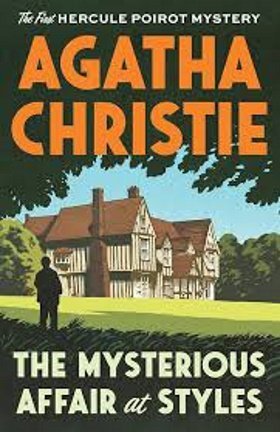But Dorcas was unshaken. Quite an hour, or even more, had elapsed between the time when she had heard the voices and five o’clock, when she had taken tea to her mistress.
The inquest was held on Friday at the Stylites Arms in the village. Poirot and I sat together, not being required to give evidence.
The preliminaries were gone through. The jury viewed the body, and John Cavendish gave evidence of identification.
Further questioned, he described his awakening in the early hours of the morning, and the circumstances of his mother’s death.
The medical evidence was next taken. There was a breathless hush, and every eye was fixed on the famous London specialist, who was known to be one of the greatest authorities of the day on the subject of toxicology.
In a few brief words, he summed up the result of the post-mortem. Shorn of its medical phraseology and technicalities, it amounted to the fact that Mrs. Inglethorp had met her death as the result of strychnine poisoning. Judging from the quantity recovered, she must have taken not less than three-quarters of a grain of strychnine, but probably one grain or slightly over.
“Is it possible that she could have swallowed the poison by accident?” asked the Coroner.
“I should consider it very unlikely. Strychnine is not used for domestic purposes, as some poisons are, and there are restrictions placed on its sale.”
“Does anything in your examination lead you to determine how the poison was administered?”
“No.”
“You arrived at Styles before Dr. Wilkins, I believe?”
“That is so. The motor met me just outside the lodge gates, and I hurried there as fast as I could.”
“Will you relate to us exactly what happened next?”
“I entered Mrs. Inglethorp’s room. She was at that moment in a typical tetanic convulsion. She turned towards me, and gasped out: ‘Alfred—Alfred——’”
“Could the strychnine have been administered in Mrs. Inglethorp’s after-dinner coffee which was taken to her by her husband?”
“Possibly, but strychnine is a fairly rapid drug in its action. The symptoms appear from one to two hours after it has been swallowed. It is retarded under certain conditions, none of which, however, appear to have been present in this case. I presume Mrs. Inglethorp took the coffee after dinner about eight o’clock, whereas the symptoms did not manifest themselves until the early hours of the morning, which, on the face of it, points to the drug having been taken much later in the evening.”
“Mrs. Inglethorp was in the habit of drinking a cup of cocoa in the middle of the night. Could the strychnine have been administered in that?”
“No, I myself took a sample of the cocoa remaining in the saucepan and had it analysed. There was no strychnine present.”
I heard Poirot chuckle softly beside me.
“How did you know?” I whispered.
“Listen.”
“I should say”—the doctor was continuing—“that I would have been considerably surprised at any other result.”
“Why?”
“Simply because strychnine has an unusually bitter taste. It can be detected in a solution of one in seventy thousand, and can only be disguised by some strongly flavoured substance. Cocoa would be quite powerless to mask it.”
One of the jury wanted to know if the same objection applied to coffee.
“No. Coffee has a bitter taste of its own which would probably cover the taste of strychnine.”
“Then you consider it more likely that the drug was administered in the coffee, but that for some unknown reason its action was delayed.”
“Yes, but, the cup being completely smashed, there is no possibility of analyzing its contents.”
This concluded Dr. Bauerstein’s evidence. Dr. Wilkins corroborated it on all points. Sounded as to the possibility of suicide, he repudiated it utterly. The deceased, he said, suffered from a weak heart, but otherwise enjoyed perfect health, and was of a cheerful and well-balanced disposition. She would be one of the last people to take her own life.
Lawrence Cavendish was next called. His evidence was quite unimportant, being a mere repetition of that of his brother. Just as he was about to step down, he paused, and said rather hesitatingly:
“I should like to make a suggestion if I may?”
He glanced deprecatingly at the Coroner, who replied briskly:
“Certainly, Mr. Cavendish, we are here to arrive at the truth of this matter, and welcome anything that may lead to further elucidation.”
“It is just an idea of mine,” explained Lawrence. “Of course I may be quite wrong, but it still seems to me that my mother’s death might be accounted for by natural means.”
“How do you make that out, Mr. Cavendish?”
“My mother, at the time of her death, and for some time before it, was taking a tonic containing strychnine.”
“Ah!” said the Coroner.
The jury looked up, interested.
“I believe,” continued Lawrence, “that there have been cases where the cumulative effect of a drug, administered for some time, has ended by causing death. Also, is it not possible that she may have taken an overdose of her medicine by accident?”
“This is the first we have heard of the deceased taking strychnine at the time of her death. We are much obliged to you, Mr. Cavendish.”

























